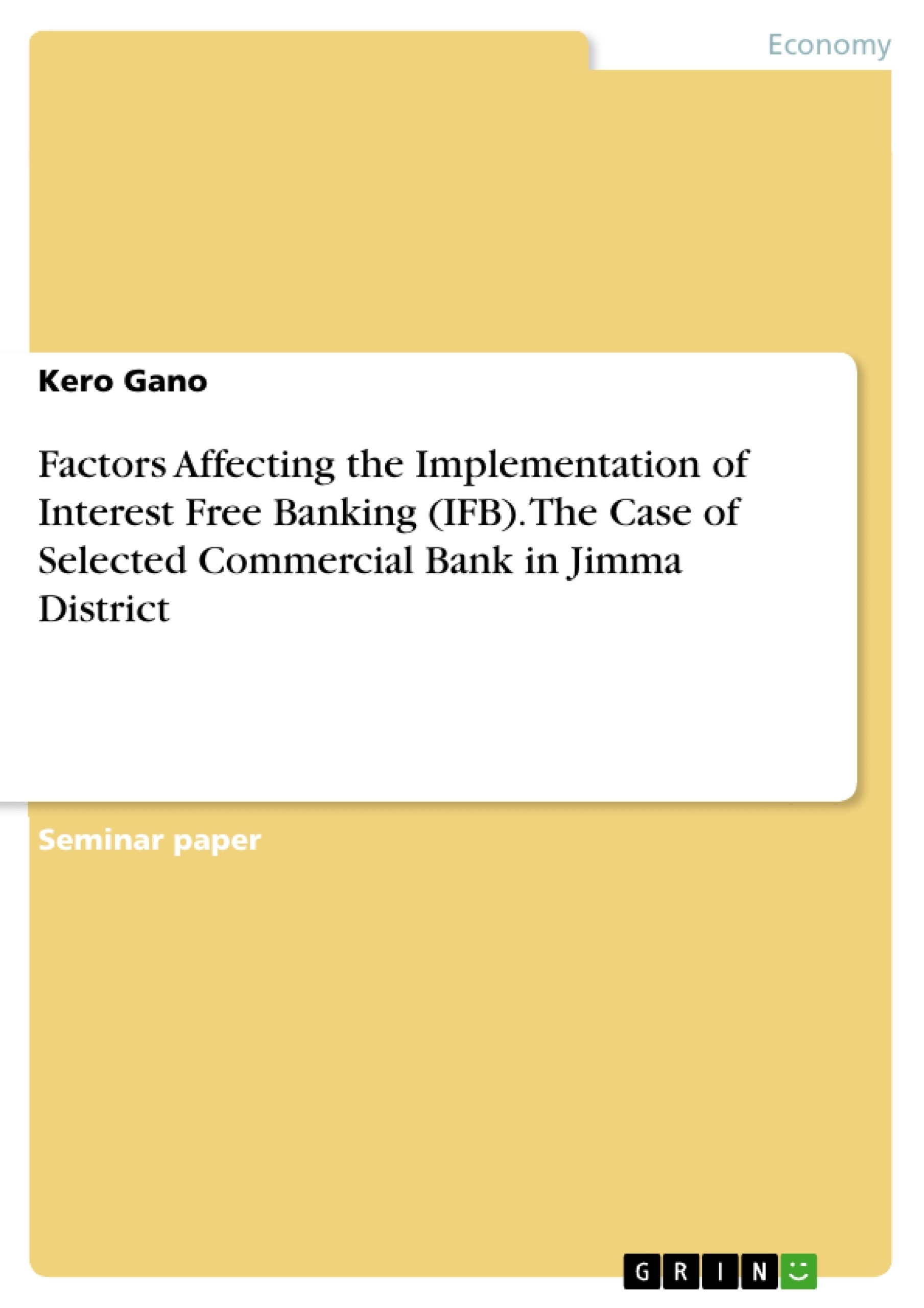The general objective of this study is to assess the factor affecting the implementation of IFB banking service in Ethiopia particular reference to CBE, OIB, and OCB and Awash bank of Jimma district in Jimma city.
The study will be employed descriptive research design based on the survey and the data collected. The study will use both primary and secondary data which are quantitative and qualitative in its nature and will have been collected through structured and semi structured questioner and interview .a total of 423 sample respondents will be taken through multistage sampling. Of the total sample interest free banking customer and staff of the bank constitute 381 and 42 respectively, the data will be analyzed using descriptive statics of percentage, tabulation, frequency and mean.
Inhaltsverzeichnis (Table of Contents)
- ABSTRACT
- ACKNOWLEDGEMENT
- Tables
- List of figure.......
- ACRONOMY
- 1.1 BACKGROUND OF THE STUDY.
- 1.2 Statement of the problem..........\n
- 1.3 Objective of the study.
- 1.3.1 General objective of the study
- 1.4 Research hypothesis
- 1.7 Organization of the paper
- CHAPTER TWO......
- 2.1 THEORETICAL LITIRATURE
- 2.1.1 Concepts of Interest Free Banking
- 2.1.2 Evolution of Islamic Banking
- 2.1.3 The Principles of Interest free banking
- 2.1.4 TYPES OF FINANCING IN ISLAMIC BANKING
- 2.1.5. Sources of Islamic legislation
- 2.1.6. Retail Islamic Banking Products
- 2.1.7. Islamic and conventional banking
- 2.2 EMPERICAL REVIEW
- 2.2.1 Studies related to Islamic banking in country specific studies
- 2.2.2 Studies related to Islamic banking in Ethiopia
- 2.2.3 Prospects of Islamic banking
- 2.2.6 Opportunities of Interest Free Banking in Ethiopia
- 2.2.7 IFB factors in Ethiopia
- 2.2.9 GAP IN THE LITRATURE REVIEW
- 2.2\nCONCEPTUL FRAMEWORK.
- 2.4 RESEARCH GAP
- CHAPTER THREE
- 3.1 Research Design
- 3.2 Research approach.......
- 3.3 Source and type of data
- 3.4 Target population of the study
- 3.5 Sampling technique and sample determination
- 3.6 Method of data collection...........
- 3.7 Methods of data analysis and presentation....
- 3.8. Data Analysis Method..\n
- 4. COST AND TIME PLAN
- 4.1 Time Plan..........\n
- 4.2 Cost budget.\n
- References
Zielsetzung und Themenschwerpunkte (Objectives and Key Themes)
This research aims to evaluate the factors influencing the implementation of Interest Free Banking (IFB) services in Ethiopia, specifically focusing on the Commercial Bank of Ethiopia (CBE), Oromia International Bank (OIB), Oromia Cooperative Bank (OCB), and Awash Bank in Jimma district. The study employs a descriptive research design based on a survey and data collection methods, utilizing both quantitative and qualitative data.
- Factors affecting the implementation of IFB services in Ethiopia
- Challenges and opportunities associated with IFB services in the Ethiopian context
- Comparative analysis of IFB services provided by different banks in Jimma district
- Impact of IFB services on financial inclusion and economic development in the region
- Recommendations for improving the implementation and effectiveness of IFB services in Ethiopia
Zusammenfassung der Kapitel (Chapter Summaries)
The first chapter introduces the research background, statement of the problem, objectives, and research hypothesis. It also outlines the organization of the research paper. Chapter two delves into theoretical literature, reviewing the concepts of interest free banking, the evolution of Islamic banking, and the principles of interest free banking. The chapter further examines types of financing in Islamic banking, sources of Islamic legislation, retail Islamic banking products, and the distinction between Islamic and conventional banking. Additionally, it explores empirical review, focusing on studies related to Islamic banking in country-specific contexts and studies related to Islamic banking in Ethiopia.
Chapter three discusses the research methodology, including the research design, approach, source and type of data, target population, sampling techniques, data collection methods, and data analysis techniques. The final chapter focuses on the cost and time plan for the research project.
Schlüsselwörter (Keywords)
The primary keywords and focus topics of this research include interest-free banking, Islamic banking, financial inclusion, Ethiopia, commercial banks, Jimma district, descriptive research design, survey data, quantitative and qualitative analysis, and economic development.
Frequently Asked Questions
What is Interest Free Banking (IFB)?
IFB is a banking system based on Islamic principles (Sharia) that prohibits the charging or paying of interest (Riba) and focuses on profit-and-loss sharing models.
Which banks were studied in the Jimma District?
The study focuses on the Commercial Bank of Ethiopia (CBE), Oromia International Bank (OIB), Cooperative Bank of Oromia (OCB), and Awash Bank.
What are the main factors affecting the implementation of IFB in Ethiopia?
Implementation is influenced by customer awareness, regulatory frameworks, staff expertise, and the availability of Sharia-compliant financial products.
How does IFB contribute to financial inclusion?
By providing Sharia-compliant services, IFB allows individuals who previously avoided conventional banks for religious reasons to participate in the formal financial system.
What types of financing are used in Islamic Banking?
Common types include Murabaha (cost-plus financing), Musharaka (partnership), and Ijarah (leasing), among others.
- Quote paper
- Kero Gano (Author), 2023, Factors Affecting the Implementation of Interest Free Banking (IFB). The Case of Selected Commercial Bank in Jimma District, Munich, GRIN Verlag, https://www.grin.com/document/1353193



